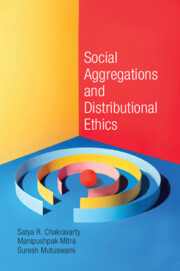Book contents
- Frontmatter
- Contents
- Preface
- 1 Introduction
- 2 Individual and Social Orderings
- 3 May’s Theorem
- 4 Arrow’s Theorem with Individual Preferences
- 5 Relaxing Arrow’s Axioms
- 6 Arrow’s Theorem with Utilities
- 7 Harsanyi’s Social Aggregation Theorem
- 8 Distributional Ethics: Single Dimensional Approaches
- 9 Distributional Ethics: Multidimensional Approaches
- 10 Social Choice Functions
- 11 Strategyproofness on Quasi-linear Domains
- Index
8 - Distributional Ethics: Single Dimensional Approaches
Published online by Cambridge University Press: 11 January 2023
- Frontmatter
- Contents
- Preface
- 1 Introduction
- 2 Individual and Social Orderings
- 3 May’s Theorem
- 4 Arrow’s Theorem with Individual Preferences
- 5 Relaxing Arrow’s Axioms
- 6 Arrow’s Theorem with Utilities
- 7 Harsanyi’s Social Aggregation Theorem
- 8 Distributional Ethics: Single Dimensional Approaches
- 9 Distributional Ethics: Multidimensional Approaches
- 10 Social Choice Functions
- 11 Strategyproofness on Quasi-linear Domains
- Index
Summary
INTRODUCTION
Often the literature on inequality measurement regards income as the only yardstick of well-being. One plausible reason for this assumption is that an increase in a person’s income is likely to increase his level of living. However, in the recent period the literature has observed a shift of emphasis from a single-dimensional structure to a multidimensional framework for the purpose of inequality evaluation. (We analyze this issue in greater detail in the next chapter.) As a starting point, in this chapter we treat income as the only dimension of well-being. This chapter forms the basis of multidimensional approaches to inequality evaluation to be analyzed in Chapter 9.
After presenting the basics and preliminaries in the next section, in Section 8.3 we analyze common features of the inequality evaluators that rely respectively on the direct and inclusive measure of well-being approaches. While in the former outlook a social welfare function is defined directly on the set of income distributions, in the latter individual utilities are aggregated to generate a welfare metric of society. The next two consecutive sections deal explicitly with inequality assessment from these two perspectives. Section 8.6 stipulates how some standard inequality indices can be interpreted within the Harsanyi (1953, 1955) framework (Dahlby 1987).
The current literature on the measurement of inequality at times considers both achievement and shortfall inequalities in some dimension of human well-being and establishes a relation between them. Section 8.7 presents a condensed essay on the related literature. A person often may desire to have access to one or more opportunities available in society from the perspectives of happiness and success. The subject of Section 8.8 is a brief discussion on opportunity equality. In the next two sections we deal with inequality for an ordinal dimension of human well-being and an ordinal approach to inequality evaluation. In the context of network engineering, a fairness indicator determines the extent to which users are receiving fair shares of resources. The concern of Section 8.11 is a brief review of the axiomatic literature developed along this line. As we will argue, the use of conventional equality metrics may not be suitable for the evaluation of fairness.
- Type
- Chapter
- Information
- Social Aggregations and Distributional Ethics , pp. 127 - 182Publisher: Cambridge University PressPrint publication year: 2023



